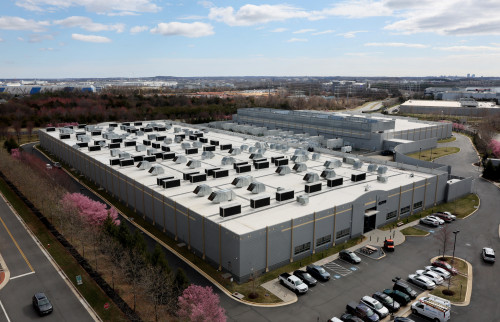By Deborah Mary Sophia
(Reuters) – U.S. President Donald Trump’s sweeping reciprocal tariffs could hamstring Big Tech’s billion-dollar efforts to build artificial intelligence infrastructure in the country, likely undermining a key goal of the administration, analysts said on Thursday.
Trump and technology executives have touted lofty plans by Oracle, SoftBank and others to invest heavily in artificial intelligence since his return to the White House earlier this year.
On Wednesday, Trump slapped steep duties on leading technology equipment suppliers including 34% on China, 32% on Taiwan and 25% on South Korea while imposing a 10% baseline tariff on all imports to the U.S.
Electronics – which include smartphones, PCs and data-center equipment – were the second biggest imports last year at nearly $486 billion worth of goods, according to Census Bureau data.
Bernstein analysts pegged data processing machine imports at about $200 billion in 2024, mostly from Mexico, Taiwan, China, and Vietnam.
“Capital expenditure by tech giants will get reshuffled: Expect major players in AI infrastructure and consumer tech to reallocate short-term spending away from expansion and toward procurement hedging or sourcing shifts,” said Abhishek Singh, partner at research firm Everest Group.
While semiconductors were exempted from Wednesday’s tariffs, the U.S. is planning targeted tariffs for chips that could come later, a White House official said.
“There’s no doubt that the equipment that goes into data centers will become significantly more expensive … Microsoft has already started articulating a more balanced, cautious approach to their data center build-out, and to some extent Amazon as well,” said D.A. Davidson analyst Gil Luria.
Big Tech shares sharply fell on Thursday, with the tech-heavy Nasdaq tumbling 4%.
Amazon, Alphabet and Microsoft did not immediately respond to requests for comment.
DARK CLOUDS
The increased costs could delay data-center expansion and AI adoption, setting back ambitious plans such as Stargate, the $500 billion data-center venture between ChatGPT maker OpenAI, SoftBank Group and Oracle.
Trump announced Stargate earlier this, with a goal to outpace rival nations in AI development. The project would span construction of 20 data centers in the United States.
“Stargate was already unlikely to get to that scale even before these things happened. Given the shock to the economy that these tariffs represent, it is highly unlikely that such a risky endeavor will be able to raise anywhere near that number in terms of debt financings,” Luria said.
The tariffs are also a new threat to the top cloud service providers such as Microsoft, Alphabet and Amazon.com, already facing skepticism from investors over their steep AI budgets.
TD Cowen analysts recently said Microsoft had abandoned data-center projects set to use 2 gigawatts of electricity in the U.S. and Europe in the last six months due to an oversupply relative to current demand.
Brokerage HSBC on Thursday also warned of a potential slowdown in spending at cloud companies next year, and cut its price target on Nvidia, the biggest winner in the AI race over the last couple of years.
“The tariffs are likely to create demand destruction, which means cutbacks on software and cloud spending. Alphabet will see a double whammy with digital advertising also cut back in a tougher economic environment – with Meta also hit,” said Ben Barringer, global technology analyst at Quilter Cheviot.
(Reporting by Deborah Sophia in Bengaluru; Editing by Sriraj Kalluvila)


